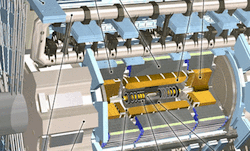Welcome to the Experimental HEP Group
 Particle Physics and Astrophysics
Particle Physics and Astrophysics
Today's high-energy physics is the culmination of twenty-five centuries of searching for an understanding of the ultimate nature of matter. The University of Toronto has one of Canada's most active groups in elementary particle physics and relativity. Over the last 30 years the standard model of particle physics has gradually taken shape. With the conclusion of the recent Z boson physics program at CERN and high energy tests at the Tevatron the standard model has withstood tests of unprecedented precision. Still, we know that this model cannot be complete. Physicists at the University of Toronto are actively trying to find ways to move beyond the current particle physics paradigm.
Ongoing experimental programs include the ATLAS experiment at CERN, near Geneva Switzerland, studying the highest energy man-made proton proton collisions, and the T2K experiment in Japan, which studies long baseline neutrino interactions. The Large Hadron Collider came into operation at CERN in 2009 and has taken over the energy frontier in particle physics since 2010. Our experimental group plays a leading role in the ATLAS experiment, with the group involved in the physics studies made possible by the datasets collected at the LHC. The group is giving priority to measurements of the Higgs boson, the top quark and the search for new phenomena not predicted by the Standard Model. The group is also playing significant roles in the maintenance, operations and upgrades for the ATLAS detector. While ATLAS hopes to find the origin of mass, the T2K experiment is investigating the deep mystery why the mass we see in our universe in galaxies, stars and us is only matter, with no antimatter component. The solution may be in an asymmetry between neutrinos and anti-neutrinos, which T2K can study in a unique way given the JPARC neutrino facility in Japan. The Toronto group is active in the neutrino beam instrumentation and the neutrino mixing angle physics analysis.
The Toronto group also has several faculty working on other experiments, such as the IceCube experiment using the very clear, very thick layer of ice at the South Pole to detect very high energy particles coming from astrophysical sources. The group also has an effort in a search for dark matter at SNOLAB, one of the world's deepest underground laboratories. The SuperCDMS experiment is being designed to search for the very lightest possible dark matter particles possible.
All of these experiments provide exciting opportunities for graduate research into new particle physics phenomena at either the M.Sc. or Ph.D. level. We give priority to giving students essential instrumentation and hardware experience working on the next generation of detectors, such as upgraded tracking detectors for ATLAS. More information on the opportunities for graduate students in our groups can be found here .
The future of particle physics is intimately connected to developments in particle accelerators to reach higher and higher energies and intensities. Our group is involved in a project on superconducting radio-frequency accelerating cavities for future accelerators.
Members of the theory group have a wide range of interests. Research areas include quark model phenomenology, dynamical symmetry breaking and gauge theories that include string theory and quantum gravity. The astrophysics effort in the Department focuses on experiment and observation, ranging from nuclear astrophysics performed at the TRIUMF TISOL and ISAC facilities to observations of the cosmic microwave background radiation using high altitude balloons. With members of the Canadian Institute for Theoretical Astrophysics (CITA), the department's research effort is one of the strongest in North America and provides a very attractive environment for graduate research.


